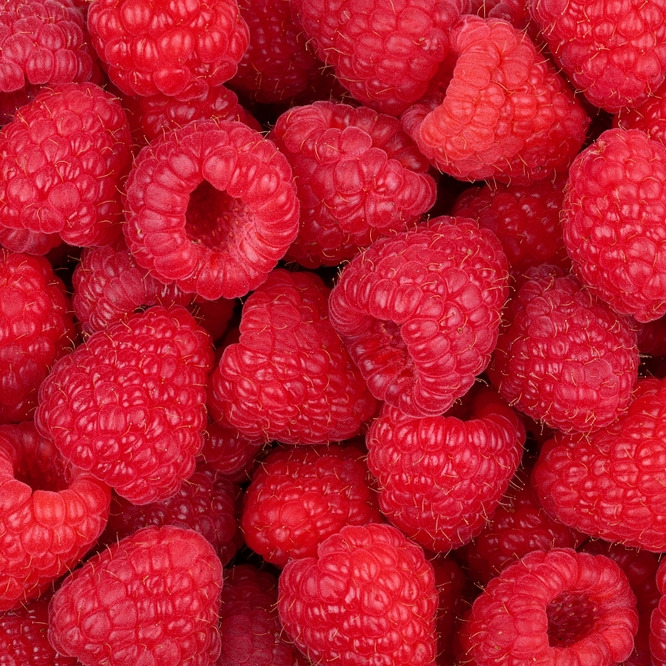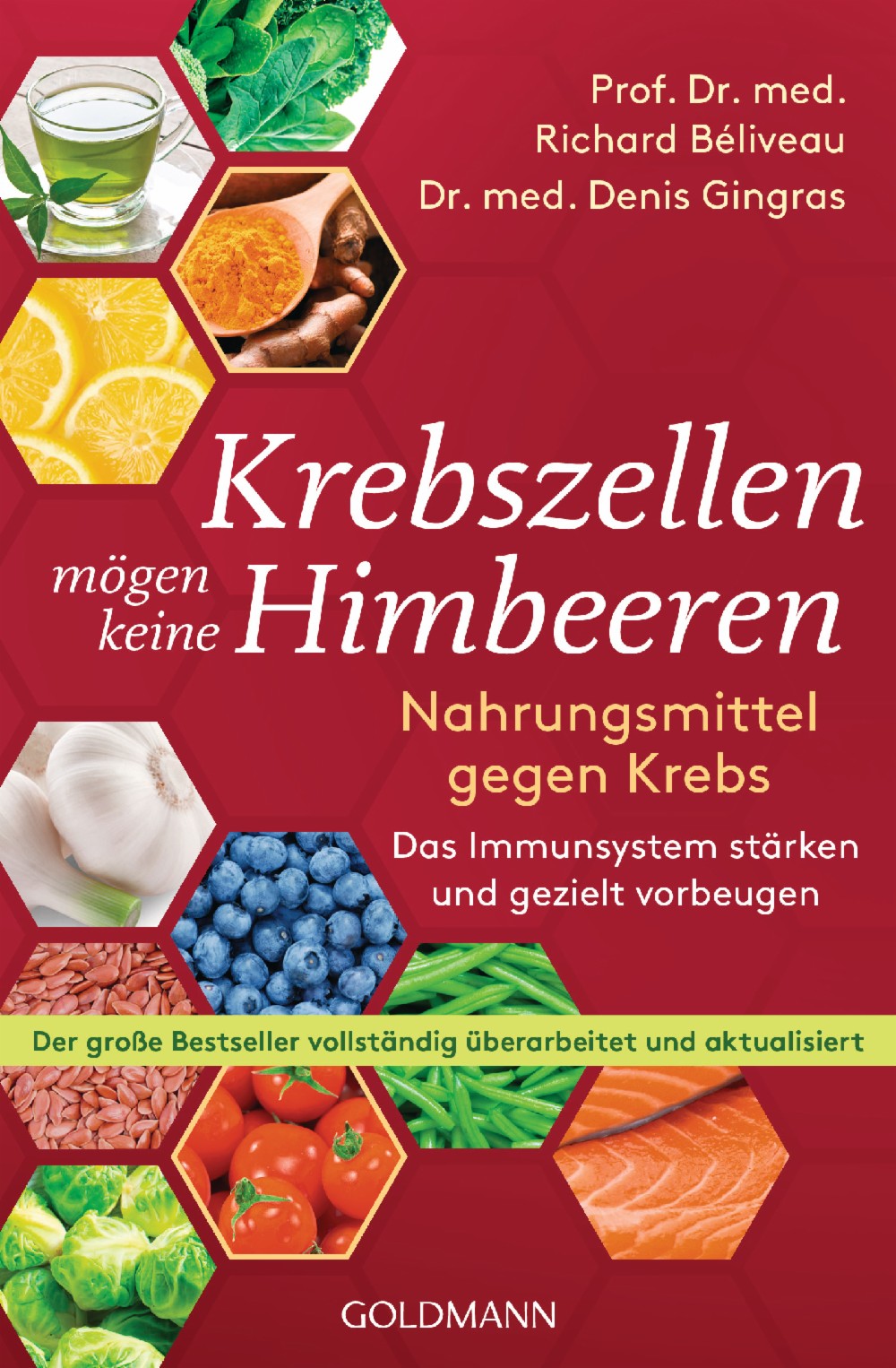
Cancer cells don't like raspberries: The role of nutrition in cancer prevention
Introduction to the topic:
Cancer cells and nutrition
Cancer cells don't like raspberries - this sentence may sound surprising at first, but it harbours deeper truths about the relationship between nutrition and cancer prevention.
In recent decades, science has made significant progress in understanding the role of food in the prevention and treatment of cancer.
In this blog post, we will take an in-depth look at the importance of nutrition, specifically the role of raspberries, in the fight against cancer.
Nutrition plays a central role in human health and can be instrumental in reducing the risk of various diseases, including cancer. Certain nutrients and compounds in foods can inhibit the growth of cancer cells or even promote their death.
A prominent example of this is raspberries, which are rich in antioxidants and phytochemicals that have been shown to have a protective effect against cancer.
Cancer cells develop when normal cells mutate and multiply uncontrollably. These mutated cells can form tumours and spread throughout the body. A healthy diet can strengthen the immune system and provide mechanisms to combat the growth and spread of these cells.
In the following sections, we will explore in detail the science behind cancer cells, the importance of antioxidants and phytochemicals in cancer prevention, and the specific health benefits of raspberries.
The science behind cancer cells: What are cancer cells?
To understand why the phrase "cancer cells don't like raspberries" has meaning, it is first important to know the science behind cancer cells. Cancer cells develop when normal cells in the body undergo genetic mutations that lead to uncontrolled cell division.
These mutations can be caused by various factors such as environmental toxins, radiation, viruses or even random errors in DNA replication.
cancer cells differ from healthy cells in several important ways:
- Uncontrolled cell division:
Normal cells have mechanisms that regulate their division. Cancer cells ignore these signals, which leads to uncontrolled proliferation. - Loss of the ability to apoptose:
Apoptosis is programmed cell death, a natural process that removes damaged or superfluous cells. Cancer cells bypass this process and thus survive longer than normal cells. - Angiogenesis:
Cancer cells promote the formation of new blood vessels to ensure their supply of nutrients and oxygen. - Metastasis:
Cancer cells have the ability to invade surrounding tissue and spread to other parts of the body. This makes cancer particularly dangerous.
These properties make cancer cells a serious health problem. Research has shown that certain nutrients and compounds in foods, such as the antioxidants and phytochemicals found in raspberries, can inhibit the growth and spread of cancer cells.
These natural compounds support normal cell processes and promote the death of cancer cells, underlining the phrase "cancer cells don't like raspberries".
The role of antioxidants and phytochemicals in cancer prevention
Antioxidants and phytochemicals play a crucial role in the prevention of cancer and are a key component of the statement "cancer cells don't like raspberries". These bioactive compounds are abundant in many plant foods, especially raspberries, and can inhibit the growth and spread of cancer cells.
Antioxidants are molecules that neutralise free radicals produced by environmental toxins, radiation or normal metabolic processes in the body. Free radicals can cause cell damage and promote genetic mutations that lead to the development of cancer. By neutralising these free radicals, antioxidants help to preserve the integrity of cells and reduce the risk of cancer. The best-known antioxidants include vitamin C, vitamin E and beta-carotene.
Phytochemicals are natural compounds found in plants that also have a protective effect against cancer. They work in different ways: Some phytochemicals can activate the body's detoxification enzymes, which render carcinogenic substances harmless, while others promote apoptosis - the programmed cell death - of cancer cells. Important phytochemicals include flavonoids, polyphenols and glucosinolates.
Raspberries are an excellent source of both antioxidants and phytochemicals. They contain high amounts of ellagic acid, a polyphenol that has been shown to promote apoptosis in cancer cells and inhibit their growth. They are also rich in vitamin C and quercetin, a flavonoid with strong antioxidant properties.
By regularly consuming raspberries and other antioxidant and phytochemical-rich foods, you can actively contribute to cancer prevention. These findings emphasise the importance of a balanced, plant-rich diet in the fight against cancer and confirm the statement: "Cancer cells don't like raspberries".
Raspberries and their specific nutrients: an in-depth look
Raspberries are not only delicious, they are also a powerhouse of nutrients that play a significant role in cancer prevention. They contain a variety of bioactive compounds that can help inhibit the growth of cancer cells and promote overall health.
Outstanding nutrients in raspberries include:
- Ellagic acid:
This polyphenol is abundant in raspberries and has powerful antioxidant properties. Studies have shown that ellagic acid can promote apoptosis in cancer cells and inhibit their growth. - Vitamin C:
As a powerful antioxidant, vitamin C protects cells from damage caused by free radicals. It also supports the immune system and promotes collagen formation, which further improves cell health. - Quercetin:
This flavonoid has anti-inflammatory and antioxidant effects. Quercetin can slow the growth of cancer cells and promote apoptosis. - Dietary fibre:
Raspberries are an excellent source of dietary fibre, which can support bowel health and help reduce the risk of bowel cancer. - Anthocyanins:
These natural pigments give raspberries their red colour and have antioxidant and anti-inflammatory properties that can have a protective effect.
Another important aspect of raspberries is their low calorie content and high water content, which makes them an ideal addition to a healthy diet. A study by the University of Illinois has shown that the compounds contained in raspberries can reduce cancer cell proliferation by up to 50%. These results emphasise the importance of raspberries in cancer prevention and confirm the saying: "Cancer cells don't like raspberries".
Studies and research results: How raspberries affect cancer cells
In recent years, scientific research has shed increasing light on the potential health benefits of raspberries, particularly with regard to their anti-cancer properties. Numerous studies have shown that the bioactive compounds contained in raspberries may play a significant role in inhibiting the growth and spread of cancer cells.
A remarkable study by the University of Illinois found that the compounds contained in raspberries can reduce the growth of cancer cells by up to 50%. In particular, ellagic acid, a powerful antioxidant in raspberries, was identified as a key factor. Ellagic acid promotes apoptosis, i.e. programmed cell death, in cancer cells, which effectively curbs their proliferation.
another example is a study published in the "Journal of Berry Research". This study showed that raspberries can inhibit the growth of breast, colon and prostate cancer cells. The researchers suspect that this is due to the high concentration of anthocyanins and quercetin, which have strong antioxidant and anti-inflammatory properties.
Preclinical studies on animals have also produced promising results. A study on mice fed a raspberry extract showed a significant reduction in tumour size and number compared to the control group. These results suggest that raspberries have not only preventive but also therapeutic potential against cancer.
In summary, these research results confirm the statement "cancer cells don't like raspberries" and emphasise the importance of raspberries as part of a cancer-preventive diet.
Practical tips for integrating raspberries into your daily diet
The health benefits of raspberries are impressive, but how can we incorporate them into our daily diet to put the statement "cancer cells don't like raspberries" into practice? Here are some practical tips and simple recipes to include raspberries in your diet.
- Breakfast:
Start your day with a healthy raspberry smoothie. Blend a handful of fresh or frozen raspberries with Greek yoghurt, a banana and some honey. This will give you a dose of antioxidants and a fresh start to the day. - Snacks:
Raspberries are a great snack between meals. You can enjoy them on their own or combine them with a handful of nuts for a balanced and nutritious snack. - Salads:
Add a handful of raspberries to your green salad. They not only add a sweet flavour, but also valuable nutrients. Combine them with spinach, avocado, walnuts and a light balsamic dressing for a tasty and healthy salad. - Desserts:
Raspberries are perfect for desserts. Try a simple raspberry parfait by alternating layers of Greek yoghurt, raspberries and granola in a glass. This is a healthy alternative to high calorie desserts. - Baking:
Raspberries can also be incorporated into baked goods. Add them to muffins, cakes or pancakes. They not only add flavour, but also increase the nutritional value of your baked goods. - Drinks:
Add a few raspberries to your water or iced tea for a refreshing flavour and an extra dose of antioxidants.
With these simple and delicious options, you can easily incorporate raspberries into your daily diet to reap the cancer-fighting benefits of this remarkable fruit.
Source list:
- https://www.amazon.de/Krebszellen-m%C3%B6gen-keine-Himbeeren-Nahrungsmittel/dp/3466346630
- https://www.lmu-klinikum.de/brustzentrum/patientenportal/zusatzangebote/ernahrung/tumorzentrum-munchen-ernahrung/c89be315cd8cc8da
- https://www.thalia.de/shop/home/artikeldetails/A1047573561
- https://www.helios-gesundheit.de/magazin/news/02/lebensmittel-gegen-krebs/
- https://www.123buch.net/p/krebszellen-moegen-keine-himbeeren-alle-4-buecher?srsltid=AfmBOoqnT6ZImK71N9P9-f_tqoD0yxIFHBKbpoq0tKS1c6f8lHUXUxZ-
- https://www.heidelberger-chlorella.de/produkte/buecher-literatur/buch-krebszellen-moegen-keine-himbeeren
- https://www.topfruits.de/buch/krebszellen-moegen-keine-himbeeren-neue-auflage?srsltid=AfmBOoqgMLXFnOzPBY2JDEqI0BDVJ7lBIuVPe2FMlAk2v84ERm2_RNQB
- https://www.skoobe.de/books/richard-beliveau/krebszellen-moegen-keine-himbeeren-das-grosse-buch-der-praevention
- https://www.penguin.de/buecher/richard-b%C3%A9liveau-krebszellen-moegen-keine-himbeeren/hoerbuch-download/9783844519815
- https://www.buecher.de/artikel/buch/krebszellen-moegen-keine-himbeeren/26250941/

